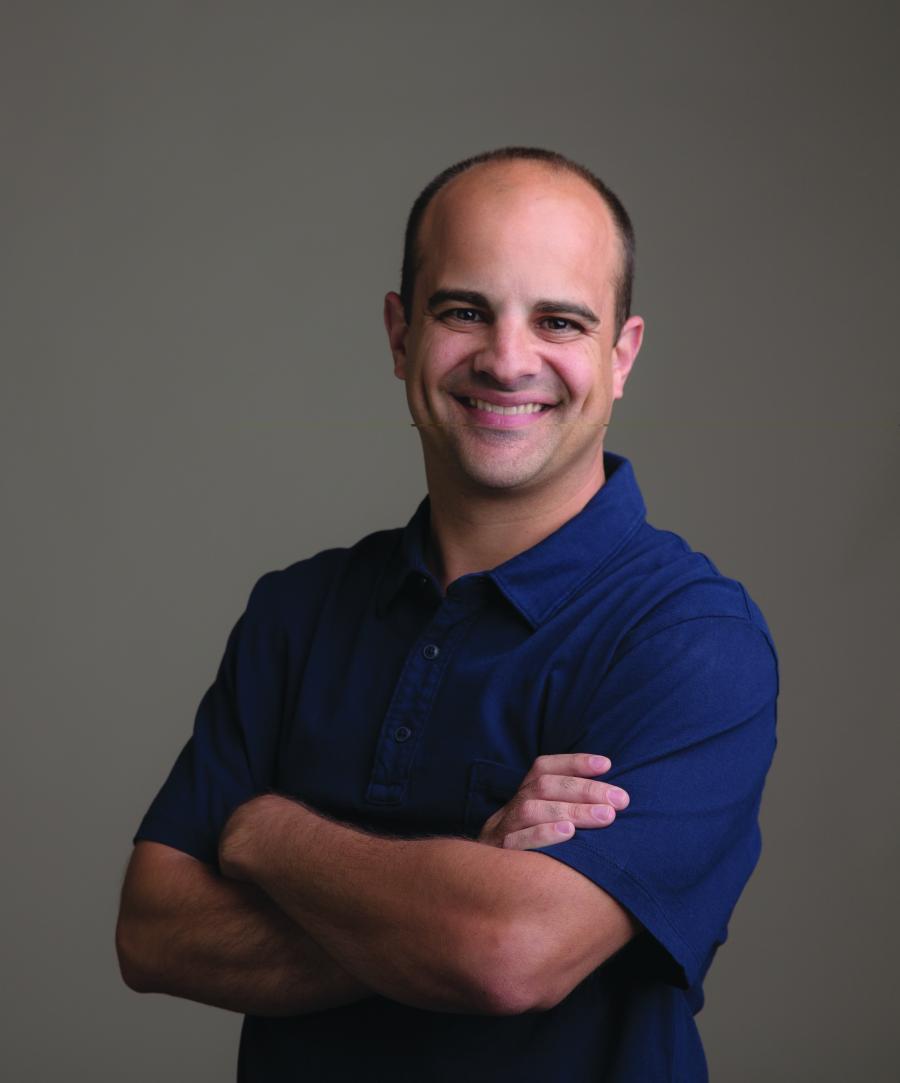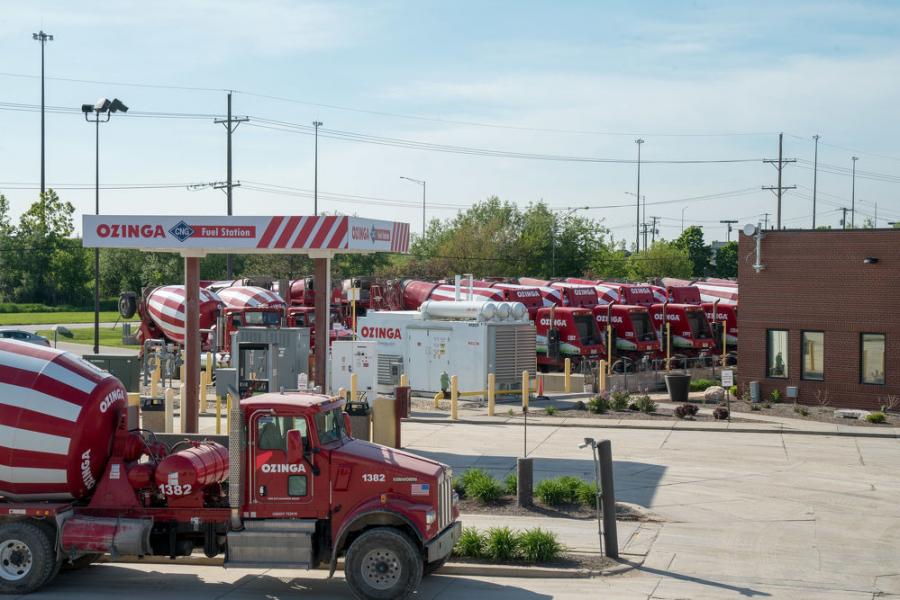Ozinga is known on the streets for its red-and-white-striped ready-mix concrete trucks.
Martin Ozinga is president of Ozinga, the construction materials, logistics and energy company headquartered in the Chicago metro area. In fact, Martin Ozinga has presided over the company for 90 years, just not the same Martin Ozinga. Marty Ozinga IV is president in 2018 and continues to groom the firm for leadership in the industry by successfully melding family, faith, and visionary business practices.
Ozinga is known on the streets for its red-and-white-striped ready-mix concrete trucks. More than a thousand of the trucks roll out of mixing plants in four states in the Great Lakes region and down south in Florida. Though the company has diversified in interesting ways, Marty Ozinga said ready-mix concrete remains Ozinga's biggest revenue producer “by far.”

In a phone interview from his office in the Chicago suburbs, Marty Ozinga IV talked about his family's business and the outlook for the company's next 90 years.
CEG: The company began in 1928 as a small coal supplier and today supplies ready-mix and other construction materials, operates truck, rail, barge and ship terminals, builds compressed natural gas stations in faraway places like California and offers logistical services. Does that broad range of services qualify the company as a “conglomerate?”
OZINGA: No, I don't like that word. I don't really see that word applying to us. We are a family business, a fourth-generation family business, and have gotten ourselves into a lot of different things and products and services. I know conglomerates exist, but Ozinga is not one. The important thing I try to focus on is our values. We always want to emphasize our foundational values to our customers, to consistently serve our customers in a way that they get a taste of our values.
CEG: Are there any indicators that your values-first approach is working over the long term?
OZINGA: We have very little turnover among our 2,000 employees. Wonderful people. They care about the company like it is their own. I think that comes through to our customers. Basically, we try to build long-term relationships with people, to communicate to them that we are here to stay and are committed for the long haul. We have to communicate that over and over — our values, our mission, our vision — communicate it to our coworkers, our customers and our community.
CEG: You majored in communications at Northwestern University, instead of focusing on a more traditional business major for an executive-in-waiting. Has the formal communication training been an advantage as a business executive?
OZINGA: I think whether you are an orator is not the issue. Whoever is the leader of a company must have a conviction that good communication is not an option. You don't have to be a great public speaker so long as you understand you have no other option except to communicate effectively.
CEG: Speaking of communicating values, in company blogs you speak openly of your religious conviction, such as acknowledging that the company leadership prays in board meetings and extolling the attributes of Christ. Has this open espousal of your Protestant faith received any pushback — vis-à-vis Hobby Lobby or Chick-fil-A — in a culture that increasingly finds religion provocative?
OZINGA: Here and there. We have picked up on objections from people who have an issue with some position we have taken. But generally speaking, within our industry anyway, by a ratio of almost a hundred to one people have shown an appreciation for our sharing our faith. We still live in a country where you can openly share your faith. It is important to us as a family. We are going to obey the law of the land, but at the same time we are going to share our faith.
We are not as high-profile a company as Chick-fil-A, and you don't want to go out of your way to cause problems. Still, at the end of the day, there are choices we all have to make. As a consequence of being open about our faith, we have received much more affirmation than ridicule or ostracism. People know where we come from and why we do what we do. We feel like we are in a position to have some influence by leading on this front.
CEG: To a lesser degree, you also have identified yourself politically, blogging about your activity in Republican ward-level politics and penning at least one blog during the 2016 presidential campaign. Has your GOP allegiance been a liability in a metro area famously run by Democrats?
OZINGA: I would say again that it takes a certain amount of judgment. You don't want to go out of your way to offend anyone. For the most part, there is a professional respect for my political belief. We maintain our integrity at the same time we try to work with people, because there are people in business on different sides of the aisle. You have to find a way to work with people, to work with local officials.
CEG: The company in its earliest days survived the recession and more recently the “great recession.” To what do you attribute your company's ability to stay afloat when companies around you are sinking or are dead in the water?
OZINGA: I think it is our resolve to do whatever it takes to survive, to remain true to our long-term commitment to our future. As a company, we have been fortunate, by the grace of God. You look at statistics and you see there is a low survival rate for four-generation companies. The big thing is just showing up. You have to like what you are doing and the company is fortunate that this generation cares about the business and the future of the business.
As for what decisions we made as a company, there was nothing real unorthodox. I mean, we stopped spending. We had to let some people go, which is never an easy thing to do, especially in a family business. One thing we learned is that the economic challenges provide some business opportunities that otherwise are absent. Some big growth opportunities came as a result of the recession. We were well-positioned and found that people, after getting beat up for a number of years by multi-nationals and such, were ready to partner. Specifically, we partnered with our cement suppliers and took over more of their operations.
CEG: Was getting the company into CNG in 2011-12 a consequence of the recession or just coincidental timing?
OZINGA: When we first started making those decisions, fuel prices were high and fracking was finding an abundance of natural gas, so it was sort of a no-brainer at the time. We like doing innovative things and this one made a lot of sense.
CEG: How many of your red-and-white-striped trucks are fueled by CNG? Do you intend to switch all of them over to natural gas?
OZINGA: We have about 150 of the concrete mixers on CNG and another 50 to 60 support vehicles. I don't know if we will ever get to a hundred percent. It depends on the technology and the price of fuel. We feel like it is a kind of hedge against other fuel prices. Mixers wouldn't be easily converted back to diesel, but some of our vehicles run on both. My personal car is both gasoline and CNG, a kind of hybrid.
CEG: Is the compressed natural gas energy division of the company also concentrated in the Great Lakes area?
OZINGA: It is independent of other operations. We recently built a couple of CNG stations in California at the request of a customer. We'll put the stations wherever people need us to go.
CEG: Is one division or another of your company experiencing especially notable growth, perhaps indicative of an industry trend?
OZINGA: I think because the CNG work is new it is experiencing a lot of growth, but so is our transportation and logistics company, which handles a lot of barge activity. We have a network of seven terminals on the Illinois River and do a lot of terminal work for third parties. It is sort of logical. Chicago is on the Great Lakes and has a river system. Our company has been on the receiving end of raw materials as a consumer. Part of the cost of construction materials is its transportation and we want to make sure that we control our destiny by controlling more of the supply chain. In the last seven or eight years, we have done more and more vertical integration.
CEG: In 2017, you leapfrogged the country and built a concrete supply plant in Miami, Fla., How did that come about?
OZINGA: We determined that once you leave the metro market of the Great Lakes, it becomes a matter of finding the business situation that makes the most sense. In Florida, we had been involved with a ready-mix operator. Some of those same folks were bending our ears at the same time we were looking for a new growth area. A lot of it had to do with the relationships we had with people down there.
CEG: Is the company on the verge of entering another tangential industry or market any time soon?
OZINGA: We are trying to differentiate our products and our services from our competitors' products and services. We are making bigger and bigger investments in technology, in the software running our fleets and on the equipment side, too. And we have an R&D lab developing new products.
CEG: Speaking of logistics, the smooth operation of a large company owned by seven family members — six of them brothers — sounds a little precarious in terms of critical decision-making and such. Has it ever proven to be?
OZINGA: We have made it a high priority to get along with one another. We have healthy debates sometimes, but at the end of the day the most important thing for us is that we get along and care about each other. We pray together, which really helps us resolve misunderstandings. That is something special.
CEG: Does the company have another 90 years in it? Do you have more generations of potential company leadership coming along?
OZINGA: I believe it has another 90 years. We'll see, but we have great clients and it's a great industry. I think we'll be around a long time. If we can stay true to our values, not compromise those values, I think we should be here quite a while. We are very interested in pushing the boundaries of our industry. We want to be an industry leader. We are innovative. With all the multi-national giants, we get a little bit lost in coverage, but we see ourselves as an industry leader.
As for succeeding generations, we have 32 kids among the seven of us. The majority of them are girls. The oldest is 16, so they are a little too young to be involved yet, but they are very interested and we are exposing them to things at the company.
CEG: The industry and national economy seem to be on the cusp of good economic fortune. Is that how you see it or are you worried about trade wars and such?
OZINGA: I am optimistic. This year so far has been a little flat, but we are very optimistic. We are making all kinds of decisions in regard to capital expenditures. We believe we are well-positioned. We believe that a lot of the fundamentals are good and that the industry has a lot of work ahead of it as the country catches up with infrastructure and housing.
CEG
Today's top stories















